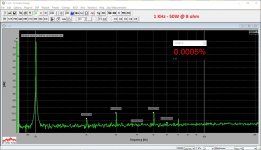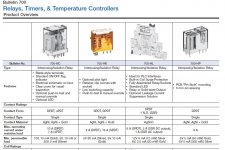If they caused distortion, why do most manufacturers of HiFi amplifiers use them?
Distortion is caused by anything that amplifies in an uncontrolled or non linear way.
Relay contacts need to be able to handle the required current with a good margin to spare.
200W into 8R will need a decent contact. Most are rated 15Amps @ 50V DC or 230V AC.
This is a reasonable relay for that sort of power; G2R-1-E 12DC | Omron SPDT Non-Latching Relay PCB Mount, 12V dc Coil, 16 A | Omron
Distortion is caused by anything that amplifies in an uncontrolled or non linear way.
Relay contacts need to be able to handle the required current with a good margin to spare.
200W into 8R will need a decent contact. Most are rated 15Amps @ 50V DC or 230V AC.
This is a reasonable relay for that sort of power; G2R-1-E 12DC | Omron SPDT Non-Latching Relay PCB Mount, 12V dc Coil, 16 A | Omron
Last edited:
A factor of 10 ... to generalise, as you just did,The fabulous Douglas Self discovered years ago that speaker relays cause significant distortion. Partly by a factor of 10.
best regard!
10 X 0 = 0.
What do you base your statement on?
I am not aware of any reputable relays that have iron contacts or the current is passed through iron.
Omron and other reputable makes use brass and coated contacts, none of which include iron.
Automotive relays however, use the cradle as a conductor and that is steel/iron but who would use an automotive relay for domestic audio.
Omron and other reputable makes use brass and coated contacts, none of which include iron.
Automotive relays however, use the cradle as a conductor and that is steel/iron but who would use an automotive relay for domestic audio.
As I wrote, contact resistance from poor conductivity. Causes losses.
I measured the Omrom G2R2 relay. The 2 section paralleled. On resistance is 2,5mohm. Measured with 5A, 50Hz AC current, checking voltage drop.
Sajti
It is not just being able to handle large currents that can be a problem, it is their inability to handle very small currents without distortion, this being caused by non linear contact resistance vs current. This is something I experienced personally with my own amp some years ago.
Without wishing to drag your original question off topic, the way forward (imo) has been the introduction of solid state relays based on low Rds FET's.
Without wishing to drag your original question off topic, the way forward (imo) has been the introduction of solid state relays based on low Rds FET's.
I measured the Omrom G2R2 relay. The 2 section paralleled. On resistance is 2,5mohm. Measured with 5A, 50Hz AC current, checking voltage drop.
Sajti
I think it isn't a matter of resistance but the material itself.
I think it isn't a matter of resistance but the material itself.
I think, that the change of the resistance can results distortion. But such low resistance, has not too big influence to the distortion.
Sajti
Hello,
Just 2 cents from me - a very practical exercise (I was actually measuring an amplifier's distortion, but anyway...). Vertical CFA + NS-OPS prototype in my lab.
Attached is the spectrum, taken at 20V RMS, 8 ohm resistive load (50W RMS), behind the mechanical speaker relay.
If the relay adds some distortion at this kind of order - I'm fine with that
The problem of mechanical relays - they may arc and latch in case they open/close with the signal on. I know at least one case of killing a woofer as a result of the amplifier failure while playing and relay latch at high power.
We have switched to the solid state relays in the most of the high-power control boards (both the speaker and the rails control).
Cheers,
Valery
Just 2 cents from me - a very practical exercise (I was actually measuring an amplifier's distortion, but anyway...). Vertical CFA + NS-OPS prototype in my lab.
Attached is the spectrum, taken at 20V RMS, 8 ohm resistive load (50W RMS), behind the mechanical speaker relay.
If the relay adds some distortion at this kind of order - I'm fine with that
The problem of mechanical relays - they may arc and latch in case they open/close with the signal on. I know at least one case of killing a woofer as a result of the amplifier failure while playing and relay latch at high power.
We have switched to the solid state relays in the most of the high-power control boards (both the speaker and the rails control).
Cheers,
Valery
Attachments
I see.I think it isn't a matter of resistance but the material itself.
So you think it´s a property of the material itself, no matter the physical parameters?
"Passing through iron, any iron" is the problem?
Well, it´s not, it does not work that way.
What matters are the actual parameters of the part we are studying; a blanket statement such as "iron distorts" without any qualifications or detail is meaningless.
All a conductor can add to an Audio signal is some series resistance, which will introduce a little voltage loss, proportional to current, and that in due time may cause distortion, as long as resistance is NOT linearly proportional to current.
So the quid of this problem lies on assumed iron resistive nonlinearity relative to current intensity.
Post a graph depicting that nonlinearity and then we can start talking.
To the point of being able of calculating distortion, go figure.
Without that, this is just idle talk about a paragraph (poorly) quoted from somewhere else, out of context.
Hello,
Just 2 cents from me - a very practical exercise (I was actually measuring an amplifier's distortion, but anyway...). Vertical CFA + NS-OPS prototype in my lab.
Attached is the spectrum, taken at 20V RMS, 8 ohm resistive load (50W RMS), behind the mechanical speaker relay.
If the relay adds some distortion at this kind of order - I'm fine with that
The problem of mechanical relays - they may arc and latch in case they open/close with the signal on. I know at least one case of killing a woofer as a result of the amplifier failure while playing and relay latch at high power.
We have switched to the solid state relays in the most of the high-power control boards (both the speaker and the rails control).
Cheers,
Valery
Interesting, what charts do you get with bridged relais?
Once upon a time we used AgCdO contacts in power relays. They were very good for high power stuff bad for small signals such in a speaker. I chose to use silver for those applications. Nowadays Cd is forbidden so hardsilver is the replacement which works good I think. Hardsilver is a AgNi alloy.The fabulous Douglas Self discovered years ago that speaker relays cause significant distortion. Partly by a factor of 10.
Has anyone had any experience with it lately. Which relays are currently suitable and on sale? It should work in the range of 200W.
best regard!
- Status
- This old topic is closed. If you want to reopen this topic, contact a moderator using the "Report Post" button.
- Home
- Amplifiers
- Solid State
- Loudspeaker Relais Distortion

